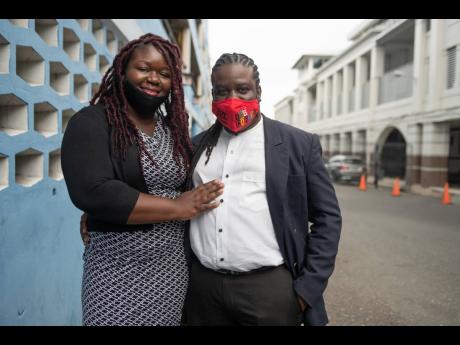Dreadlocked student’s right to humane treatment breached
Lawyers for the self-proclaimed Nazarene couple, whose child was refused a place at Kensington Primary School because of her dreadlocks hairstyle, yesterday argued that the Full Court erred in finding that the child’s constitutional rights had not been breached.
Lead counsel for the family, attorney-at-law Michael Hylton, QC, further argued that the court was wrong to have ruled that the child’s father, Dale Virgo, had no right or capacity to bring the claim, as his rights were not affected by the school’s no-dreadlocks grooming policy, which had formed the basis for the child’s denial of entry.
The case, which had sparked raging public debate, came to the fore in 2018 after the child’s mother, Sherine Virgo, having secured a place at the school, was later told that the child would not be accepted unless her hair was cut.
The school’s ultimatum was made on the basis that, in its experience with children with dreadlocks, the hairstyle often results in lice infestation and “junjo”, as the hair is not washed regularly.
Consequently, the child, who is referred to in the claim as ZV, and her father filed a constitutional claim against the school, the education ministry and the attorney general, contending that their rights had been breached, and sought a number of declarations and orders.
The child, as a minor, was represented by her mother in the capacity as next friend.
The Full Court, however, ruled last July that the child’s constitutional rights had not been breached and that the father had no locus standi.
But Hylton, during his submission in the Court of Appeal yesterday, charged that ZV’s rights to religion, expression and equitable and humane treatment were breached, as well as her right to tuition in public school.
He similarly contended that both appellants’ right to private and family life were breached and asked the appellate judges to find that their constitutional rights had been trampled on as a result of the school’s policy, which he described as “irrational” and “disproportionate”.
Pertaining to ZV’s rights to religion, Hylton posited that the Full Court, in accepting that the child’s dreadlocks hairstyle was an expression of her Nazarene beliefs and based on Sherine’s affidavit, the court should have found that her religious rights had been breached.
Hylton said that also similarly flawed was the respondents’ argument that the court had not accepted that ZV’s hairstyle was an expression of her Nazarene beliefs and that, in order for the court to accept that, the belief must meet a minimum standard, which it said Virgo’s did not.
Hylton argued that the only minimum standard that was required was for the belief to be genuinely held and that this was the case for the appellants.
He also argued that the idea behind his client’s wearing of dreadlocks was clearly expressed to the court. However, he objected to the respondent’s ground that a child cannot have a right to freedom of expression, pointing out that, if the court accepts that, it would be denying a child that right.
As it pertains to Dale Virgo’s constitutional right being breached – specifically, his respect for and protection of private and family life – Hylton argued that this right protects a child’s right as a member of a family unit. As such, he said there was a breach because the family had certain practices and rituals that bond them, including their hairstyle, and were being asked to depart from that.
Meanwhile, director of state proceedings, attorney-at-law Althea Jarrett, QC, who represented all three respondents, argued that, in order for there to have been a breach of ZV’s right to freedom of religion, it was incumbent on the Virgos to have disclosed to the school that their child was wearing her dreadlocks as an expression of the family’s religious beliefs.
She also defended the Full Court’s ruling that Dale Virgo had no right to bring a claim. She insisted that there was no evidence that the school’s grooming rule had affected him personally or his own social identity.
Further, she said there was no evidence to support his claim in the affidavit that the school was pressuring him to cut the child’s hair.
The hearing continues today in the Court of Appeal.

